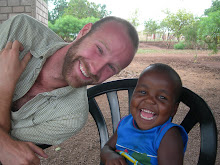“In
It is 2am and I can hear nothing except the beating of drums and the ululation of women in the distance. The sound resonates throughout the night air and is carried for what seems like miles. The beats switch back and forth between quick erratic pulsations and calm steady drumming. If I close my eyes, I picture a pulsating heart in distress; a heart that no longer beats within a body and thus must be continued within the drums themselves.
This Missa (mee-sah) ceremony is the only sound in the night to which my mind has not yet become accustomed. Families perform this ritualistic drumming on the anniversary of the death of a close relative. In the beginning it is performed every year on the date of their death, but eventually the family will gather together every 3 or 5 years, staying up all night drumming and dancing. It is a unique connection people have here with the dead.
This sound continues to keep me awake at night because unlike the clanging of rain on my tin roof or the rooster crowing way before its time, this noise has feeling and passion. This drumming tells a story far too familiar in this country; one of loss and grief. I lie awake reflecting on all the questions I’m not supposed to know. Who was this person? How did they die? Who did they leave behind? Are the relatives doing this ritual out of respect and remembrance or fear of upsetting a dead ancestor, or both?
Two weeks later I am given the opportunity to answer some of these questions first-hand when a woman that works in my organization tells me that she is participating in a Missa ceremony that evening in remembrance of her grandmother who passed away last year. I asked to participate and was told to show up at around 11pm.
Upon arrival I noticed that most of the people there participating were women, each sitting on their capulanas or astera mats. There were about five water jugs being beaten by sticks to a steady beat that alternated depending on the song being sung by the group. Cups of Canhu, a traditional drink made this time of year, are being circulated amongst the participants. Because I am a man, I am immediately given a chair and handed a cup of Canhu by a young girl. As per tradition, I drink the brew in it's entirety in one long gulp then hand it back to the girl for more. The drink is strong but still retains a hint of its original sweetness.
Eventually I am handed a water jug and a stick and join the other women in the collective drumming. I find it easy to get creative with my beats by interchanging them on occasion, acting as leader of the group and watching as the others rush to match my rhythm. For the first time, I realize what a calming effect drumming has on me. Eventually I cease to pay attention to what I am doing and just let my hands do the work. The other drummers follow my lead and before long one of the older women gets up and dances to match my rhythm.
My thoughts turn to death and its very real presence within the community. Back home, death was always an abstract concept, befalling the elderly and the occasional random accident. Here it is a fixture in the daily lives of my neighbors and friends; a constant reminder of the frailty of life. Death touches young and old, so it is common to see people wearing a black patch of cloth on their shirts to signify the loss of a loved one. Burials are quick ordeals, and emotional public mourning or crying lasts only about three days. Wives of the dead will dress in black for a year, and siblings or parents will wear some kind of black clothing for six months. People have had to adapt to losing loved ones before their time.
At daybreak, everyone moves to the grave site, flowers are placed and more songs are sung. All together, it is a remarkable way to bring together family and friends to remember those who have died. Since that night, I find the drumming keeps me up less and less, as things which were once strange become slightly more familiar.
